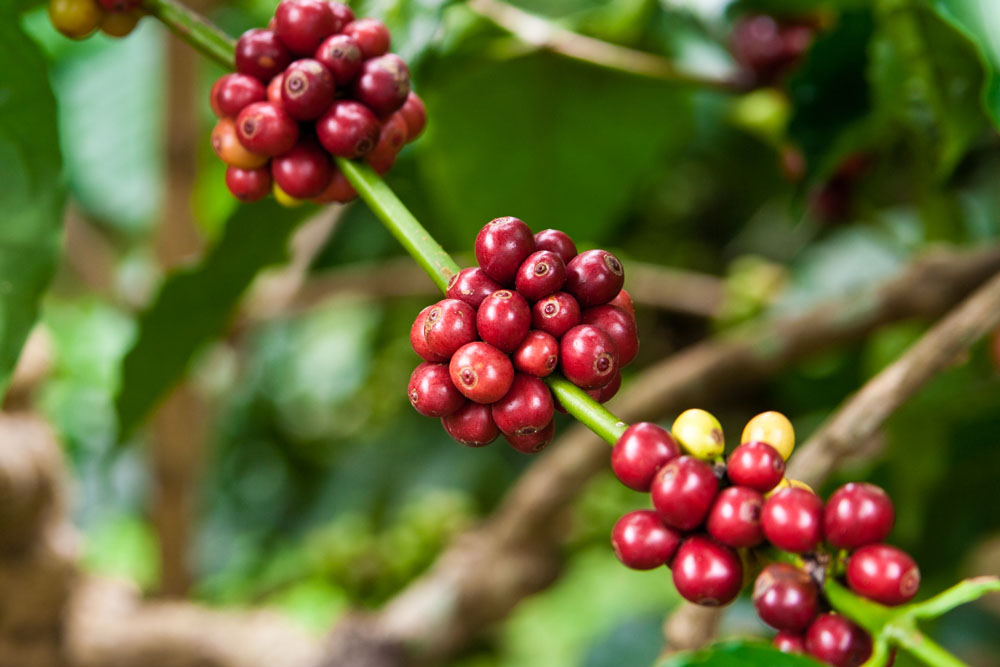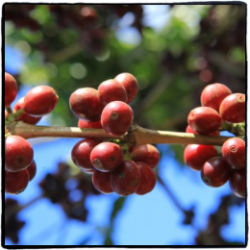Kochere Kochel of the Sigiga Cooperative in Ethiopia
During the harvest, farmers harvest fresh red fruit every day, and every two days the coffee fruit is sent as a unit or sold to a water washing plant for treatment. coffee fruit without a water treatment plant is usually naturally fermented for about 12 hours, and then passed through the sun for drying and shelling. in any case, farmers always try their best to send them to the water treatment plant for treatment. In order to sell better under the name of "washing treatment", in the water wash, coffee cherries soften the pulp after soaking and fermenting for about 12 hours, then pass through the waterway and stir to separate the pulp from the coffee beans. the pulp is discharged with the floodgates, while coffee beans need six days of sunshine to dry, but the processing time is only from sunrise to 11:00 and from 03:00 to sunset. The water content of raw beans after treatment should be about 12% ~ 12.5%. After selecting residual or shoddy beans, they are packed in sacks and trucked to the coffee auction house in the capital, Addis Ababa.
Sigiga Cooperative (1600-2500 m)
Production area: Gedeo-Kochere Kochel
Number of members: 1862
Land attribute: red brown soil
Certificate: Fair Trade Fair Trade, UTZ Sustainable cultivation, Organic Organic Coffee

Important Notice :
前街咖啡 FrontStreet Coffee has moved to new addredd:
FrontStreet Coffee Address: 315,Donghua East Road,GuangZhou
Tel:020 38364473
- Prev

Tumticha Cooperative Coffee Bean Ethiopian Yega Chefe Fine Coffee
Coffee is Ethiopia's main economic crop and the country's largest crop export and important industry. It accounts for 60% of Ethiopia's total export value and supports many small farms, as well as sugar, bananas and cotton. It is also Ethiopia's largest and important commodity export crop after oil, and it is also the largest export of Elaraby in Africa, in 1997.
- Next

Finchewan cooperative Vina goo Ethiopia boutique coffee Yega Sheffield Sidamo
There are many water treatment plants on the main roads of coffee producing areas, especially in Jima area, and a large number of treatment plants are not fully utilized because of the fierce competition, so the person in charge of the treatment plant pays higher prices to farmers, but worries about whether they can make a profit. Nowadays, a kilogram of raw beans is usually sold for about 2 Birr (Ethiopian units).
Related
- Detailed explanation of Jadeite planting Land in Panamanian Jadeite Manor introduction to the grading system of Jadeite competitive bidding, Red bid, Green bid and Rose Summer
- Story of Coffee planting in Brenka region of Costa Rica Stonehenge Manor anaerobic heavy honey treatment of flavor mouth
- What's on the barrel of Blue Mountain Coffee beans?
- Can American coffee also pull flowers? How to use hot American style to pull out a good-looking pattern?
- Can you make a cold extract with coffee beans? What is the right proportion for cold-extracted coffee formula?
- Indonesian PWN Gold Mandrine Coffee Origin Features Flavor How to Chong? Mandolin coffee is American.
- A brief introduction to the flavor characteristics of Brazilian yellow bourbon coffee beans
- What is the effect of different water quality on the flavor of cold-extracted coffee? What kind of water is best for brewing coffee?
- Why do you think of Rose Summer whenever you mention Panamanian coffee?
- Introduction to the characteristics of authentic blue mountain coffee bean producing areas? What is the CIB Coffee Authority in Jamaica?

